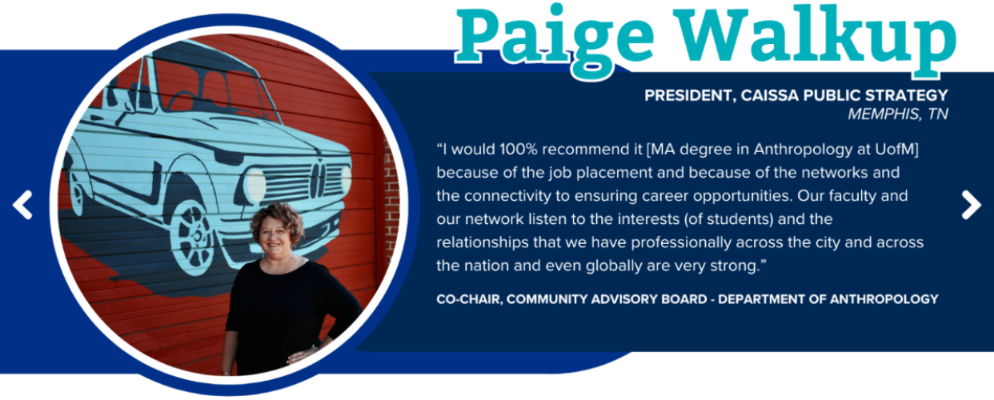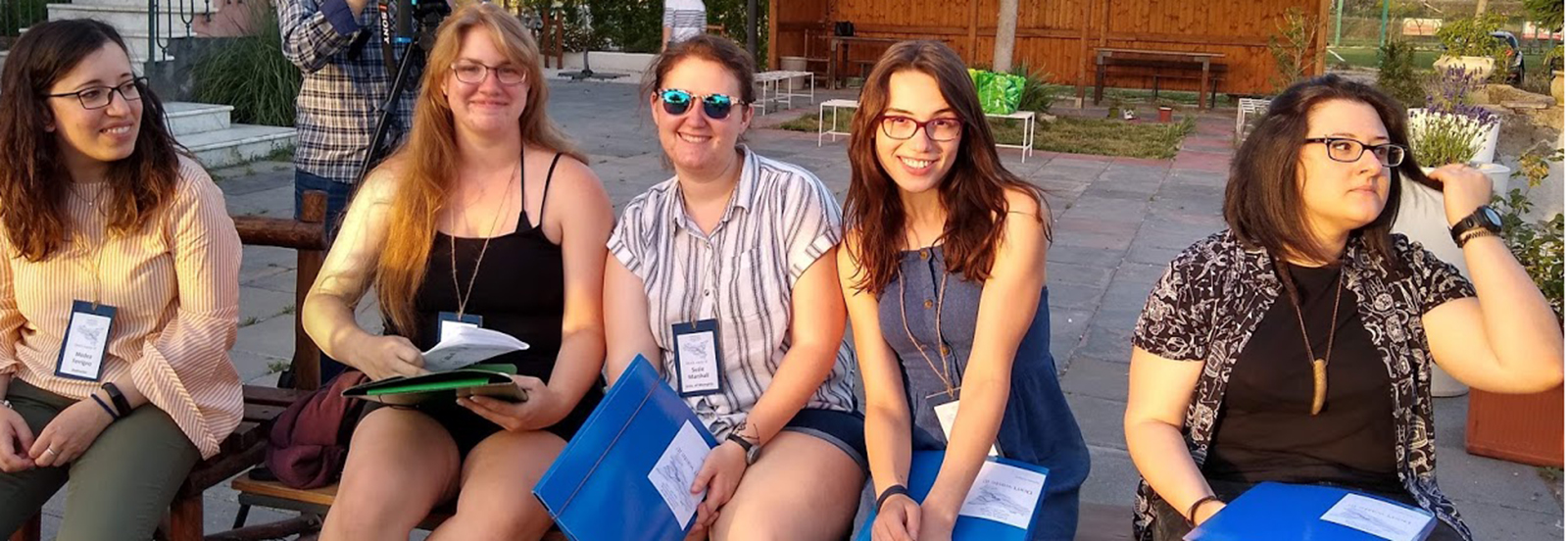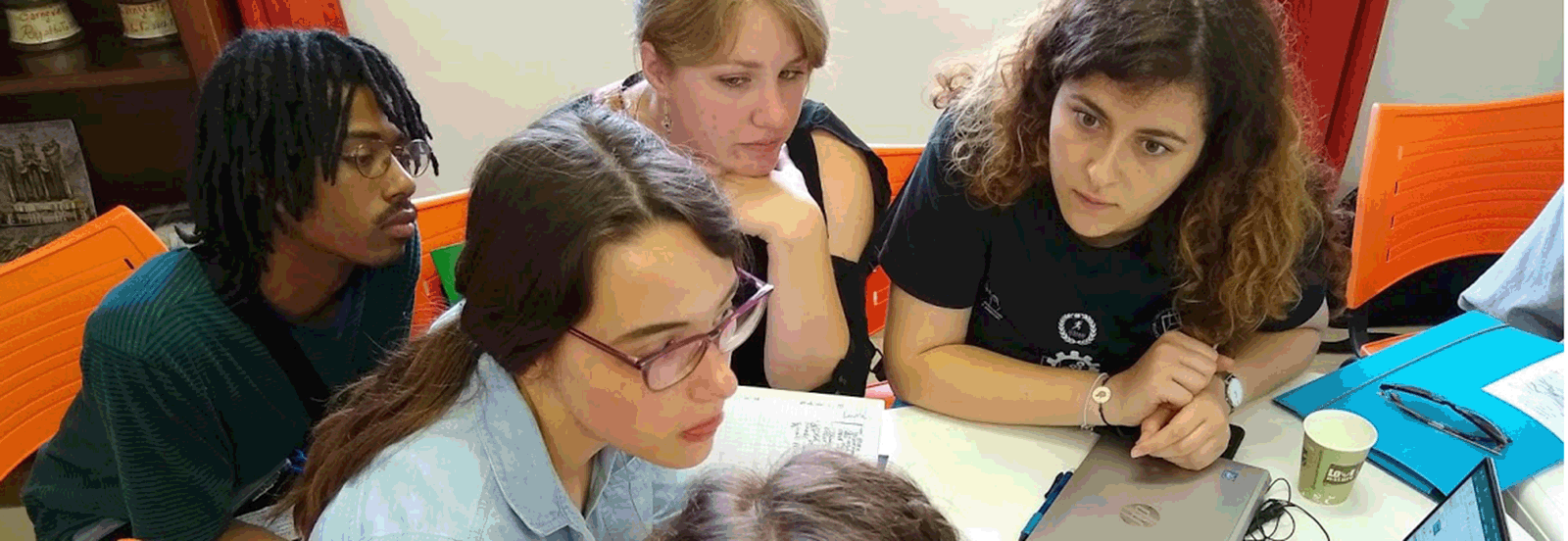Department of Anthropology
Department of Anthropology
What is Anthropology, and what does training in Anthropology do for you?
Anthropology is the study of humankind. Anthropologists explore the culture, evolution, behavior, beliefs, and social organization of peoples around the world in prehistoric, historic, and contemporary contexts.
Anthropology majors develop cross-cultural communication, human relations, critical thinking, writing, analysis, evaluation, problem-solving, planning, and community outreach skills. It is an ideal field to prepare for jobs that require people skills, and understanding of multicultural and institutional dynamics. The minor in Anthropology is also valuable for those planning to work with diverse national and international populations.
The University of Memphis Offers Two Anthropology Degrees
Students pursuing a Bachelor of Arts in Anthropology have the opportunity for training in three of the four subfields: cultural and biological anthropology and archaeology. Students can also take advantage of numerous opportunities for enriched learning, such as internships, service learning, and study abroad. Students with diverse interests will find anthropology a stimulating major or minor relevant to understanding pressing real-world issues. In our last Senior Exit Survey, students were 100% satisfied with the accessibility of faculty and 94% satisfied with the quality of teaching.
Students pursuing a Master of Arts in Anthropology join a nationally-recognized applied program. Students benefit from opportunities to work directly with local organizations and gain experience in community development, environmental justice and sustainability, cultural identity, and heritage, health disparities, healthcare systems, health risk, and business anthropology. The networks, knowledge, and experience students build is invaluable for future employment. In a 2014 survey, 90% of alumni from the MA program reported that they were satisfied with the quality of their education. Over 84% say their MA plays a significant role in their overall career satisfaction.
First year graduate students are also eligible to apply for the Tim Bolding Scholarship in Anthropology.
Why Anthropology at the University of Memphis?
The Anthropology program celebrated its 50th year in 2022. We were among the first MA programs in applied anthropology in the nation and continue to serve as an exemplar. Innovating the “Memphis Model” of applied anthropology1 we have been, and continue to be, leaders in addressing health, social, environmental, and developmental challenges in the region. We achieve this through three core strengths:
Outcomes Focused Academics: An exceptionally strong national reputation for engaged and applied anthropology, leading to meaningful careers for graduates of our program.
- A National Model: Several R1 institutions modeled programs after ours (e.g., University of North Texas; IUPUI; Mississippi State University).
- Global Access: Our online BA appears on 4 national rankings lists, including reaching #5 for Best Online Bachelor’s Anthropology Degree in 2023.
- Career Readiness: Employment rate for graduates is 99% within 6 months. Graduates are employed globally across public, private, and nonprofit sectors like: St. Jude Children’s Hospital/ALSAC, FedEx, LinkedIn, Ebay, United Housing, Habitat for Humanity, ServiceMaster, City of Memphis, Shelby County Government, among many others.
- Teaching Innovation: We offer instruction across multiple modalities and routinely incorporate high impact learning practices (study abroad, field schools, service learning).
Renowned Faculty & Strong Research Enterprise: High impact scholarship and international recognition for applied, engaged and public research.
- Funded Research: Faculty are highly active in seeking external funding, with excellent success rates across a range of funding sources (e.g., National Geographic Society, TN Dept of Education,Kemmons Wilson Family Foundation), and innovative in securing corporate and private sponsorship for applied ethnographic research (e.g., ServiceMaster, Innovate Memphis)
- Award-winning Scholarship: Faculty are recognized through external awards and fellowships (e.g., Fulbright, AAA President’s Award, American Academy of Religion Fellowship, Sierra Club Environmental Justice Award), and internally (e.g., Alumni Association Distinguished Teaching Award, CAS Early Career Research Award, Distinguished Research Award for Engaged Scholarship, Marcus Orr Center for the Humanities Fellowships, Dunavant and Faudree Professorships, and Community of Research Scholars).
- Disciplinary Leadership: Faculty serve in key leadership roles (Executive Board members and Chairs of major committees) in our top professional organizations such as the American Anthropological Association (AAA), the Society for Applied Anthropology, and the Consortium for Practicing and Applied Anthropology (COPAA), the latter of which was founded by Memphis faculty.
- Public Impact: Faculty are routinely featured in the media (e.g., WIRED magazine;The Conversation) and court systems (e.g., InterAmerican Commission on Human Rights) for their subject matter expertise.
Exemplary Alumni and Community Support: Robust alumni network and active Community Advisory Board support faculty community engagement and career support for students.
- Our Community Advisory Board (CAB) is unique and serves as a model for other applied anthropology departments. We regularly seek CAB members’ feedback about programmatic changes, ensuring we serve the needs of the surrounding community. Few programs have this level of alumni engagement.
- Alumni serve as mentors for our students, offering one-on-one networking, as well as attending classes and workshops to help guide our program to stay current with emerging employment trends. Our recent careers panel had 40 attendees and featured alumni from the corporate sector, public institutions, and nonprofits, in both domestic and international settings.
- Alumni also give generously to the Department. Between 2018 and 2022, our foundation account increased 725%, and alumni were behind the endowment of the Tim Bolding Scholarship in Anthropology, and establishment of industry-sponsored graduate assistantships (ServiceMaster, ALSAC/St. Jude, Terminix). Likewise, alumni sponsored our 50th celebration and fundraiser with nearly 100 in attendance and are helping us launch a new fund for student research and professional development.







